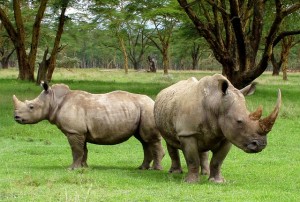Rhinos to be relocated in response to recent surge in poaching
As a result of the relentless efforts of poachers in Kruger National Park in South Africa, approximately 500 rhinos are set to be evacuated from the area. Poaching is rampant in this park; more rhinos are killed here annually than in any other part of the country. The horn of the rhino is taken by hunters, and then sold in Asian countries, where it is used in traditional medicines.
 As a conservation enthusiast, Tunde Folawiyo may be aware that the announcement regarding the evacuation was made by Edna Molewa, the Environment Minister. She explained that the establishment of ‘rhino strongholds’, coupled with the relocation of these animals, would help to ensure the survival of the species, adding that her department acknowledge that the poaching which occurs in South Africa contributes to an illegal billion-dollar international wildlife trade. She pointed out that although poaching is still a serious problem, the number of rhino poachers arrested in recent times has risen considerably. The South African government will be supporting the evacuation, and will also be examining the possibility of introducing harsher penalties for those who are caught poaching.
As a conservation enthusiast, Tunde Folawiyo may be aware that the announcement regarding the evacuation was made by Edna Molewa, the Environment Minister. She explained that the establishment of ‘rhino strongholds’, coupled with the relocation of these animals, would help to ensure the survival of the species, adding that her department acknowledge that the poaching which occurs in South Africa contributes to an illegal billion-dollar international wildlife trade. She pointed out that although poaching is still a serious problem, the number of rhino poachers arrested in recent times has risen considerably. The South African government will be supporting the evacuation, and will also be examining the possibility of introducing harsher penalties for those who are caught poaching.
The news of the planned evacuation coincided with another rhino death, which took place at the Care for Wild Africa centre. The orphaned calf was killed by a poacher who had trespassed on the property. Its mother had been poached just a few weeks earlier, whilst roaming in a private game reserve.
Being interested in wildlife conservation, Tunde Folawiyo might know that poaching has also become a threat to the rhinos residing in Kaziranga Park, in Assam. As the officials who maintain this park have few resources at their disposal, establishing security around the park’s perimeters has proven difficult. This, coupled with the fact that poachers in this area are trained, armed and organised, makes it next to impossible to protect the rhinos living here. A report prepared by forest officials states that most of those who poach here are involved in militant groups, and therefore have easy access to sophisticated weapons and tracking technology. To counteract this, the report proposed that new habitats be created for rhinos. It was also suggested that new technology and infrastructure be introduced in vulnerable areas such as Kaziranga Park.
Folawiyo is passionate about wildlife conservation. However, this is just one of the many things which interest him. Those who wish to learn more about this businessman can do so by reading this interview with Tunde Folawiyo.
 Tunde Folawiyo
Tunde Folawiyo
Leave a Reply